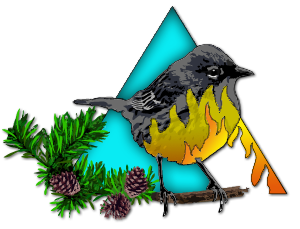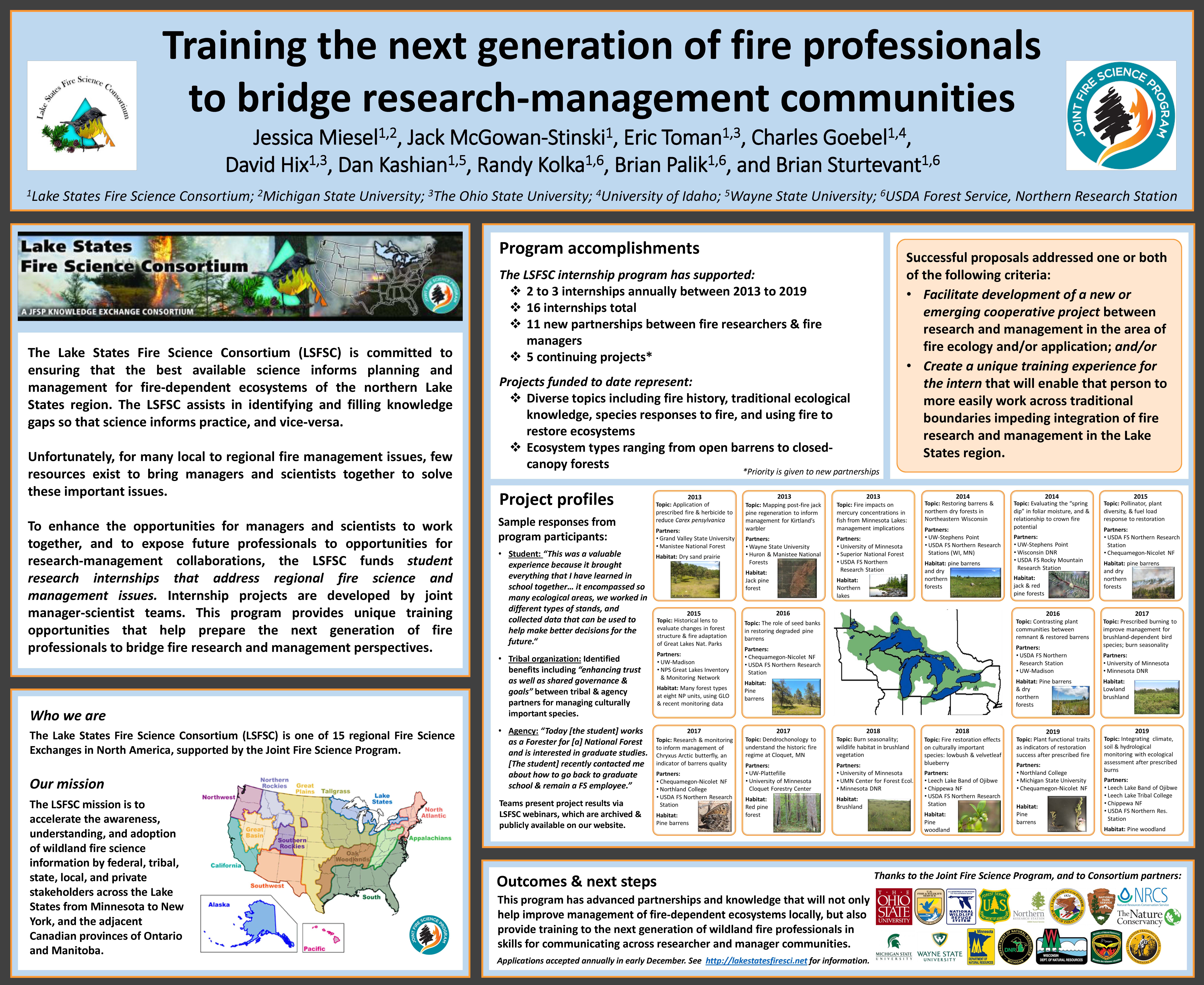Navigation

Upcoming Events
There are no events planned.

What is the LSFSC Intern Program?
“Training the next generation of fire professionals to bridge research-management communities”
The Lake States Fire Science Consortium (LSFSC) is committed to ensuring that the best available science informs planning and management for fire-dependent ecosystems of the northern Lake States region. The LSFSC assists in identifying and filling knowledge gaps so that science informs practice, and vice-versa. Unfortunately, for many local to regional fire management issues, few resources exist to bring managers and scientists together to solve these important issues. To enhance the opportunities for managers and scientists to work together, and to expose future professionals to opportunities for research-management collaborations, the LSFSC funds student research internships that address regional fire science and management issues. Internship projects are developed by joint manager-scientist teams. The LSFSC has funded 15 internships between 2013-2019, supporting ten new partnerships between fire researchers and fire managers, and five continuing projects. Topics included fire history, culturally-important species, birds, seedbanks, invertebrates, and overall ecosystem restoration. Projects focused on dry northern forests, hemiboreal forests, pine forests and barrens, and “brushland” ecosystems. These projects have advanced partnerships and knowledge that will not only help improve management of fire-dependent ecosystems locally, but also provide training in communicating across researcher and manager communities to the next generation of wildland fire professionals.
View or Download the 2019 LSFSC Intern Program Poster
VIEW the 2021 Funding Announcement Webpage for Details on how to apply, criteria, and deadline
Review below the Past “Intern Project” Webinars (2013-2020)
Year |
Titles |
Webinar Completed |
| 2013 |
|
December 19, 2013 |
| 2014 |
|
December 18, 2014 |
| 2015 |
|
November 19, 2015 |
| 2016 | Combined Webinar Title: Restoration of fire-dependent pine barren ecosystems in northern Wisconsin – Bridging the gap between research and management practices. | November 17, 2016 |
| 2017 |
|
January 25, 2018 |
| 2018 |
|
March 27, 2019 |
| 2019 |
|
February 26, 2020 |
| 2020 |
|
Webinar TBD 2021 |
Intern Proposal Review Criteria
- Does the proposed study fall within the LSFSC and northern Lake States Region?
- Is there a clearly articulated fire and/or management issue? Is this an important fire and/or management issue?
- At what scale is the issue relevant? While local issues are fine, the broader the application of the potential proposal the better.
- Is there a clear plan of action that will help ensure success of the project, and how the intern will help accomplish this plan of action?
- Are there clear deliverables and a reasonable timeline to complete the proposed project?
- To what extent does the proposal meet the following goal: Create a unique training experience for the intern that will enable that person to more easily work across traditional boundaries impeding integration of fire research and management in the Lake States Region?
- To what extent does the proposal meet the following goal: Facilitate development of a new or emerging cooperative project between research and management in the area of fire ecology and/or implementation?
- Is there a clear indication that the proposal stems from a collaborative effort between a manager-scientist team, and is there a plan for this collaborative team to continue beyond the internship program?
DOWNLOAD Review Criteria
Intern Expectations
During the internship, the undergraduate student should meet with partners, local land managers and project scientists to better understand careers in natural resource management (in fire-dependent ecosystems). Interns should participate in formal reflective exercises designed to maximize the benefits of the internship to the student. For example:
- Early internship - assessing and adapting goals. What expectations or "misconceptions" did you have about your internship that you recognize now after working for a couple of weeks? How are you reacting to or changing what you do? Have your goals changed?
- Experience mid-way through internship - Describe one challenging experience you’ve had so far in your internship and how you’ve handled it. Describe one positive experience and what you’ve learned from it.
- End of internship reflection - How did the internship impact your career goals? What do you know about yourself? Your strengths? Your role within a team? Working effectively with others? Adapting to a new culture?
Intern Projects Lessons Learned
- Manager-scientist relationships are more easily facilitated when each side is familiar with each other prior to developing a partnership
- Manager-scientist relationships can be relatively easily facilitated with clear communication and empathy about the needs of each side
- Manager requires a useable product; scientist requires publication
- Manager requires a product in a timely fashion; academic may prefer student training
- Manager should be kept abreast of progress at all times
- Manager may be much more supportive of student interns than one might expect, especially if they are supervised elsewhere
- Be aware of the constraints on the student intern in completing the project in the context of the rest of their life
DOWNLOAD Lessons Learned
VIEW or DOWNLOAD the Standard Operating Procedure and Conflict of Interest
Questions about the LSFSC Intern Program
Eric Toman, LSFSC Program Director (toman.10@osu.edu; 614-292-7313)
Jack McGowan-Stinski, LSFSC Program Manager (mcgowan-stinski.1@osu.edu; 989-287-1734)

.png)
